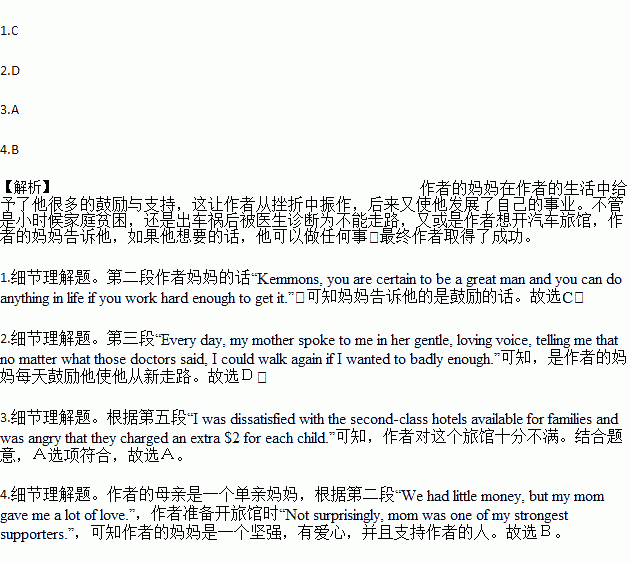题目内容
Some people bring out the best in you in a way that you might never have fully realized on your own. My mom was one of those people.
My father died when I was nine months old, making my mom a single mother at the age of eighteen. While I was growing up, we lived a very hard life. We had little money, but my mom gave me a lot of love. Each night, she sat me on her lap and spoke the words that would change my life, “Kemmons, you are certain to be a great man and you can do anything in life if you work hard enough to get it.”
At fourteen, I was hit by a car and the doctors said I would never walk again. Every day, my mother spoke to me in her gentle, loving voice, telling me that no matter what those doctors said, I could walk again if I wanted to badly enough. She drove that message so deep into my heart that I finally believed her. A year later, I returned to school — walking on my own!
When the Great Depression (大萧条) hit, my mom lost her job. Then I left school to support the both of us. At that moment, I was determined never to be poor again.
Over the years, I experienced various levels of business success. But the real turning point occurred on a vacation I took with my wife and five kids in 1951. I was dissatisfied with the second-class hotels available for families and was angry that they charged an extra $2 for each child. That was too expensive for the average American family. I told my wife that I was going to open a motel (汽车旅馆) for families that would never charge extra for children. There were plenty of doubters at that time.
Not surprisingly, mom was one of my strongest supporters. She worked behind the desk and even designed the room style. As in any business, we experienced a lot of challenges. But with my mother’s words deeply rooted in my soul, I never doubted we would succeed. Fifteen years later, we had the largest hotel system in the world — Holiday Inn. In 1979 my company had 1,759 inns in more than fifty countries with an income of $ 1 billion a year.
You may not have started out life in the best situation. But if you can find a task in life worth working for and believe in yourself, nothing can stop you.
1.What Kemmons’ mom often told him during his childhood was ______.
A. caring B. moving
C. encouraging D. interesting
2.According to the author, who played the most important role in making him walk back to school again?
A. Doctors. B. Nurses.
C. Friends. D. Mom.
3.What caused Kemmons to start a motel by himself?
A. His terrible experience in the hotel.
B. His previous business success of various levels.
C. His mom’s support.
D. His wife’s suggestion.
4.Which of the following best describes Kemmons’ mother?
A. Modest, helpful, and hard-working.
B. Loving, supportive and strong-willed.
C. Careful, helpful and beautiful.
D. Strict, sensitive and supportive.

